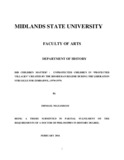Please use this identifier to cite or link to this item:
https://cris.library.msu.ac.zw//handle/11408/2878Full metadata record
| DC Field | Value | Language |
|---|---|---|
| dc.contributor.author | Mazambani, Ishmael | - |
| dc.date.accessioned | 2017-09-19T13:14:58Z | - |
| dc.date.available | 2017-09-19T13:14:58Z | - |
| dc.date.issued | 2016 | - |
| dc.identifier.uri | http://hdl.handle.net/11408/2878 | - |
| dc.description.abstract | This thesis provides a historical analysis of the plight of children who were the most vulnerable group and unprotected inside Protected Villages (PVs). It contributes to the historiography of the liberation struggle in Zimbabwe with special focus on experiences of children inside Protected Villages (PVs/Keeps). PVs were first established in 1973 by the Rhodesian Government as a counter-insurgency strategy to isolate the guerrillas. The thesis further unmasks the official Rhodesian justification of the establishment of Keeps, captures the African perspectives on Keeps, and articulates the psychological ramifications of life inside Keeps on children and the humanitarian crisis faced by caged children. The thesis is empirically grounded in various case studies of Keeps across Rhodesia. The experience of children inside Keeps remains under-researched in Zimbabwean historiography. The thesis contends that children inside PVs deserve serious historical investigation in order to understand and appreciate the fact that children were not spared by war. The thesis demonstrates empirically that children were military targets and were caught-up in the middle as the Rhodesian regime and the guerrillas used violence and coercion as a military and survival strategy. Keeps exposed children to sexual abuse, diseases, hunger, shortages and other vices associated with horrific conditions inside these punishment enclosures. The thesis is based on extensive oral testimonies of former inmates, archival sources, secondary sources and official Rhodesian sources. The thesis subverts the Rhodesian colonial propaganda that Keeps were established for humanitarian reasons as safe havens which protected children in particular and African people in general. The thesis is anchored in the deconstructive approach. Colonial and nationalist narratives of Protected Villages will be deconstructed and a new narrative by those who were children inside them will be constructed. Primary and secondary sources were used in the construction of this new narrative. | en_US |
| dc.language.iso | en | en_US |
| dc.publisher | Midlands State University | en_US |
| dc.subject | Historical analysis | en_US |
| dc.subject | Children | en_US |
| dc.subject | African people | en_US |
| dc.title | Did children matter? : unprotected children in “protected villages” created by the Rhodesian regime during the liberation struggle for Zimbabwe, (1970-1979) | en_US |
| dc.type | Thesis | en_US |
| item.languageiso639-1 | en | - |
| item.openairecristype | http://purl.org/coar/resource_type/c_18cf | - |
| item.fulltext | With Fulltext | - |
| item.openairetype | Thesis | - |
| item.cerifentitytype | Publications | - |
| item.grantfulltext | open | - |
| Appears in Collections: | Thesis | |
Files in This Item:
| File | Description | Size | Format | |
|---|---|---|---|---|
| Mazambani THESIS 2016.pdf | Full Text | 3.51 MB | Adobe PDF |  View/Open |
Page view(s)
148
checked on Apr 12, 2025
Download(s)
184
checked on Apr 12, 2025
Google ScholarTM
Check
Items in MSUIR are protected by copyright, with all rights reserved, unless otherwise indicated.



